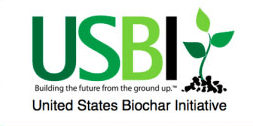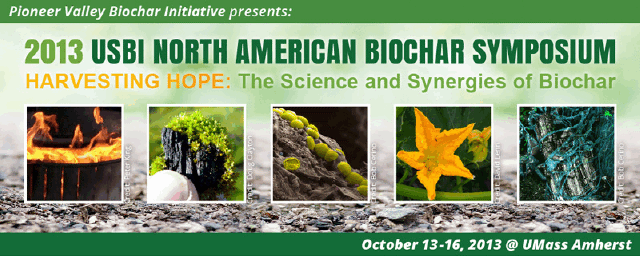Feedstocks & Production
Location
CC 163
Start Date
15-10-2013 1:30 PM
End Date
15-10-2013 2:50 PM
Session Description
Rescuing biochar: Pre - application techniques to enhance plant responses to biochar additions: Nigel Gale, U of Toronto
A growing body of literature indicates variable responses of different plant species to biochar, including positive, neutral, and negative, suggesting that it is important to investigate the nature and mechanism of species-specific responses to biochar additions. Neutral or negative plant responses to additions of biochars have commonly been reported in prior studies, and are likely the result of a combination of changes in soil properties (e.g. pH, surface area, and nutrient and water retention) and the production of volatile organic compounds from pyrolysis. In a series of greenhouse studies in Toronto, Ontario, we tested the effects of: dosage (0, 5, 10, 20, 50 t/ha); biochar type (Maple batch and Spruce batch 475°C, Maple flow-through 575°C); and application method (complete mixing vs. top dressing) on the growth and performance of two temperate species commonly used as forage crops and for erosion control: Lolium multiflorum, and Trifolium repens. Freshly produced biochars generally resulted in neutral or negative biomass and leaf area responses regardless of the dosage, biochar type, or application method. Pyrolysis typically produces biochars that contain significant amounts of volatile organic compounds that may have substantial inhibitory effects on plant growth. We subsequently tested methods to ameliorate effects of toxic compounds sorbed by biochars during production, using washing (with water and oil) and convection heating (50-150°C) techniques prior to biochar application. Preliminary results demonstrated that heating biochars at 100-150°C for 24 hours reduced toxic effects exhibited in leaf area by 20% for Lolium grown in mixed biochars applications. Similarly, Lolium grown in water-washed biochars showed a 17% increase in leaf area relative to non-washed controls in soils where biochar was applied as a top dressing. Our results suggest that pre-application heating and/or washing treatments may substantially enhance plant responses to biochar, in some cases reversing negative effects.
Intuitive Inoculation: Doug Clayton, Dale Hendricks
Pre-treating biochar by incorporating it into the composting process has become standard practice for many gardeners, small farmers and permaculturists. Doug and Dale have not only been layering biochar into their compost piles but also pre-soaking their biochars in liquid fish and seaweed fertilizers, molasses, fermented teas, human urine, etc. We are suggesting that incorporating biochar into a comprehensive combination of “composting” processes (hot, cold, vermi-, ferments, etc.), using all of nature’s avenues for breaking down organic matter, may provide a superior biochar treatment. There may be no better inoculation of biochar than that achieved by passing it through a worm’s gut. Both “red wigglers” and “night crawlers” make this an easy process to achieve. Worms thrive in finely ground, urine soaked biochar. Biochar can assist with the efficient and safe recycling of urine, maintaining the fertility of hundreds of square feet of garden plot, giving those who already have fertile soil, and seemingly lack a problem for biochar to fix, an avenue of beneficial use. We will show compost nutrient level test results and pictures of our processes and plant trials.
Included in
Agricultural and Resource Economics Commons, Organizational Communication Commons, Other Environmental Sciences Commons, Soil Science Commons
Pre-Soil Techniques
CC 163
Rescuing biochar: Pre - application techniques to enhance plant responses to biochar additions: Nigel Gale, U of Toronto
A growing body of literature indicates variable responses of different plant species to biochar, including positive, neutral, and negative, suggesting that it is important to investigate the nature and mechanism of species-specific responses to biochar additions. Neutral or negative plant responses to additions of biochars have commonly been reported in prior studies, and are likely the result of a combination of changes in soil properties (e.g. pH, surface area, and nutrient and water retention) and the production of volatile organic compounds from pyrolysis. In a series of greenhouse studies in Toronto, Ontario, we tested the effects of: dosage (0, 5, 10, 20, 50 t/ha); biochar type (Maple batch and Spruce batch 475°C, Maple flow-through 575°C); and application method (complete mixing vs. top dressing) on the growth and performance of two temperate species commonly used as forage crops and for erosion control: Lolium multiflorum, and Trifolium repens. Freshly produced biochars generally resulted in neutral or negative biomass and leaf area responses regardless of the dosage, biochar type, or application method. Pyrolysis typically produces biochars that contain significant amounts of volatile organic compounds that may have substantial inhibitory effects on plant growth. We subsequently tested methods to ameliorate effects of toxic compounds sorbed by biochars during production, using washing (with water and oil) and convection heating (50-150°C) techniques prior to biochar application. Preliminary results demonstrated that heating biochars at 100-150°C for 24 hours reduced toxic effects exhibited in leaf area by 20% for Lolium grown in mixed biochars applications. Similarly, Lolium grown in water-washed biochars showed a 17% increase in leaf area relative to non-washed controls in soils where biochar was applied as a top dressing. Our results suggest that pre-application heating and/or washing treatments may substantially enhance plant responses to biochar, in some cases reversing negative effects.
Intuitive Inoculation: Doug Clayton, Dale Hendricks
Pre-treating biochar by incorporating it into the composting process has become standard practice for many gardeners, small farmers and permaculturists. Doug and Dale have not only been layering biochar into their compost piles but also pre-soaking their biochars in liquid fish and seaweed fertilizers, molasses, fermented teas, human urine, etc. We are suggesting that incorporating biochar into a comprehensive combination of “composting” processes (hot, cold, vermi-, ferments, etc.), using all of nature’s avenues for breaking down organic matter, may provide a superior biochar treatment. There may be no better inoculation of biochar than that achieved by passing it through a worm’s gut. Both “red wigglers” and “night crawlers” make this an easy process to achieve. Worms thrive in finely ground, urine soaked biochar. Biochar can assist with the efficient and safe recycling of urine, maintaining the fertility of hundreds of square feet of garden plot, giving those who already have fertile soil, and seemingly lack a problem for biochar to fix, an avenue of beneficial use. We will show compost nutrient level test results and pictures of our processes and plant trials.



Bio and Photo
Doug Clayton has been a self-employed designer-builder and steward of integrated food, shelter, energy and water systems for over 30 years and a biochar enthusiast since before it was called “biochar”.
Dale Hendricks is a long time horticulturalist and plant propagator. For 21 years he co-owned and was President of www.northcreeknurseries.com Since ’09 he has been with www.greenlightplants.com growing a variety of native and edible plants in biochar enhanced mixes. He also has been incorporating biochar in the garden since ’09.